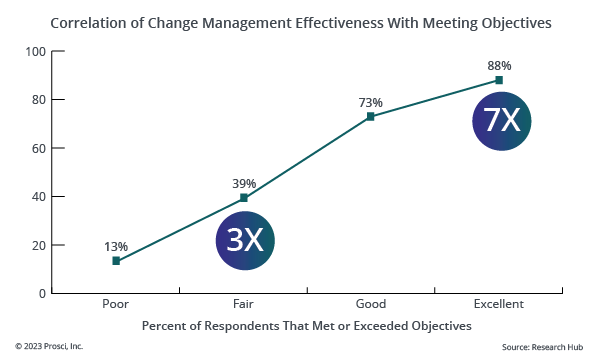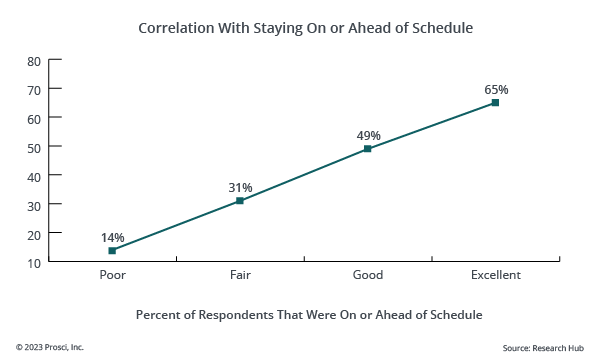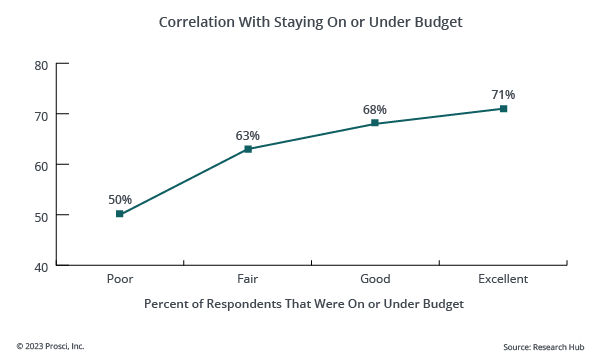The Correlation Between Change Management and Project Success

3 Mins
Updated: October 30, 2025
Published: June 7, 2023

Despite the growth of change management as a discipline and an increased understanding of its value, many professionals find it challenging to get support for it in their organizations. Fortunately, Prosci research reveals change management's clear value in three key areas that resonate with key stakeholders.
Prosci's benchmarking research studies include correlation data and other insights you can use to substantiate your claims and present a compelling case for change management. And today, you can access interactive features to find insights that are uniquely relevant to your change and organization.
Correlate Change Management
With Outcomes
If you are a change management professional, you are well aware of the pivotal role your work plays in achieving successful project results and desired outcomes. But sharing what you do, how well you do it, and even how much people will benefit usually isn't enough for executives, project leaders, and other decision makers. You need to talk about what you deliver in tangible terms. To give you support, including resources and budget, leaders want data.
Prosci's benchmarking studies offer the data and insights you need to substantiate your ideas and present a compelling case for change management. During our most recent Best Practices in Change Management research study, we asked more than 2,600 change practitioners these key questions:
- To what degree did the project meet objectives?
- To what degree was the project on schedule?
- To what degree was the project on budget?
- What is the overall effectiveness of your change management program?
Analyzing their responses, Prosci correlated data from the final question on change management effectiveness with the three dimensions of project success: meeting objectives, staying on schedule, and staying on budget. The result? The more effectively they managed the people side of change, the better the outcomes.
Meeting objectives
The graph below shows how change management effectiveness correlates with meeting project objectives. The data points represent the percentage of participants who met or exceeded objectives in each of the change management effectiveness categories (poor, fair, good and excellent).

Of the participants who had excellent change management programs in place, 88% met or exceeded objectives. Of those with good change management programs, 73% met or exceeded objectives, while 39% with fair change management programs met or exceeded objectives. Only 13%—or about 1 in 8—of those with poor change management programs met or exceeded objectives.
What's especially interesting about this data is that you can achieve a threefold improvement in project outcomes simply by applying fair change management. Although we wouldn't encourage it, even poor change management can make an impact. And with excellent change management, your project is approximately seven times more likely to meet objectives than with poor change management.
Given that projects typically include strategic or financial objectives, change management offers a very compelling argument for enabling project, financial and strategic success.
Staying on schedule
Effective change management also correlates directly with the ability to stay on or ahead of schedule. With excellent change management, your project is nearly five times more likely to be on or ahead of schedule than with poor change management. Again, in addition to meeting project objectives, the better you manage the people side of change, the more likely your project is to finish on time.

This correlation underscores an important point to make with project managers who object to change management because of the time commitment. Those who believe change management will slow them down often aren’t familiar with the data, which clearly shows that projects with effective change management are actually more likely to stay on schedule.
Staying on budget
The figure below shows the observable correlation between change management effectiveness and the ability to stay on budget. With excellent change management, your project is nearly 1.5 times more likely to stay on or under budget than with poor change management.

This chart is great for addressing another main objection from project leaders who say they understand why change management is important but don't have the budget to support it. Certainly, change management resources come with costs, and project managers must work with budget constraints. However, the data reveal that projects with effective change management are in fact more likely to remain on or under budget than those with poor change management.
Avoid the Costs of Rework
Effective change management reduces common project headaches, such as rework, redesign, rescoping and other consequences that arise when you neglect the people side of a change. The reality is that these consequences are far more than frustrations—they extend project timelines and add unplanned costs.
Actively preparing, equipping and supporting people impacted by your project through change management mitigates and even prevents rework and other issues. Of course, change management also enables your people to successfully adopt and use the solution you're implementing, which protects your investment and ROI.
Build Your Case With Supporting Data
Leveraging a strong, quantitative argument will help you gain support for change management with project leaders and other stakeholders, and now you have convincing data to share. And with the interactive capabilities in Prosci's research dashboards, you can customize these correlations, drill down into the data, and present the most compelling case for change management possible.




